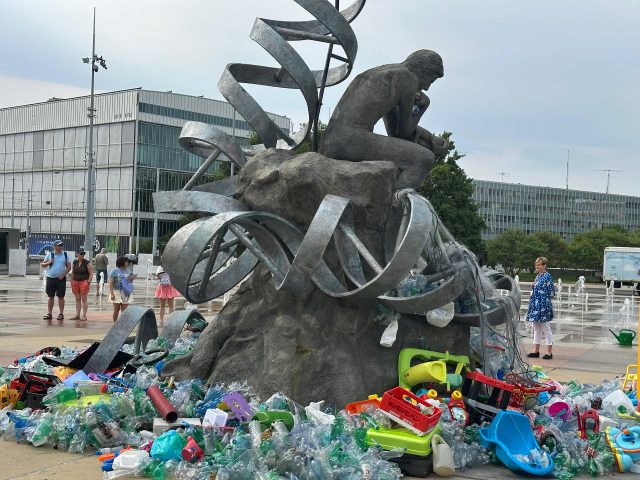After more than ten days of extensive discussions, delegations from about 184 countries were unable to reach a consensus on the adoption of an internationally binding treaty on plastics pollution.
The negotiations were held in Geneva, Switzerland.
This outcome highlights existing divisions among participating nations within various negotiation groups, as parties rejected two proposed drafts intended for adoption. Similarly, the third version of a proposed draft published at the early hours of Friday before the commencement of the closing plenary, was equally shelved by parties.
“The fifth session of the second part of the Intergovernmental Negotiating Committee (INC-5.2) is hereby adjourned and will resume at a later date,” declared the Chair of the INC, Luis Valdivieso, in response to mounting pressure from the Heads of Delegation from Kuwait and the United States, who expressed frustration at the progress of the negotiations.
The difficulties in achieving consensus became apparent on Friday, following an extension of negotiations that were initially scheduled to conclude on 14 August, but which extended to 15 August due to repeated delays in convening the closing plenary session.
During the closing plenary, delegates/representatives of the participating countries took turns to express their concerns and devotion to achieve an encompassing agreement in the near future.
As the session was drawing to a close, questions requesting details of what next by some country representatives got no definitive response from the presiding chair.
PREMIUM TIMES observed that the plenary hall was somewhat scanty due to the repeated adjustment of the plenary schedules against the will of delegates and participants.
INC-5.2
Last week Tuesday, nearly 4000 participants, including negotiators from over 180 countries, reconvened in Geneva for what was intended to be the final round of talks to establish a legally binding global instrument on plastic pollution.
The convening, which kick-started over three years ago, is against the backdrop of a resolution (5/14) reached by member states at the fifth session of the UN Environment Assembly (UNEA-5.2) in March 2022.
The resolution, entitled “End plastic pollution: Towards an international legally binding instrument,” requested the Executive Director of UNEP to convene an Intergovernmental Negotiating Committee (INC) to develop “an instrument.”
This instrument is to be based on a comprehensive science-based approach that addresses the full life cycle of plastic, including its production, design, and disposal.
This did not happen, as negotiations meant to achieve a “balanced and all-inclusive” treaty remain inconclusive amidst divergent views among member states.
Nigeria’s concerns and demands
In its immediate reaction to the adjournment of the INC-5.2 plenary, Nigeria’s Head of Delegation in Geneva, Jibrin Ahmadu, expressed the country’s commitment to reconstructive engagement.
However, he noted that Nigeria cannot support an outcome that disregards its core positions, urging parties to work towards a text that is balanced, implementable and inclusive.
“Nigeria’s circumstances and capabilities must be respected in line with the principles of common but differentiated responsibilities,” the official said.
Additionally, he stressed the need for robust, predictable and adequately resourced financial mechanisms, alongside guaranteed access to appropriate and affordable technology. These, Mr Ahmadu said, are essential to drive meaningful and sustainable implementation of the plastics instrument.
“Without these enabling pillars, the ambition of this treaty will remain unattainable particularly for developing countries,” he said.
Core demands
Mr Ahmadu said, as emphasised during the delegation’s meeting, Nigeria calls for a clear and inclusive definition that leaves no ambiguity in scope.
Also, he identified recognition of the national action plan as a primary vehicle for implementation, and that it should be guided but not restrained by international frameworks.
Nigeria also called for the removal of bracketed text and unclear provisions that undermine certainty, and an implementation framework that is fair and supportive of national development priorities.
“Nigeria acknowledges and welcomes the proposal for Kenya to host the secretariat, noting the strategic geographical and political significance of situating it on the continent of Africa,” he noted.
Africa’s position
In her remarks, Ghana’s ministry of environment director for policy planning, monitoring and evaluation, Lydia Essuah, who spoke on behalf of the Africa group, said Africa did not start it, but can end it.
“We, the Africa region, reaffirm our common ambition to end plastic pollution through a legally binding global treaty that protects human health and the environment,” she said.
READ ALSO: UPDATED: Global Plastics Treaty: Nigeria, other countries reject proposal
She explained that the treaty must include measures that address plastics across the full lifecycle as mandated by UNEA resolution 5/14, that was adopted by consensus by parties.
“African countries came to these negotiations with more than words; we have been fully committed to this process,” the official said, noting that a binding commitment to end plastic pollution must be accompanied by clear obligations to provide multilateral finance that is adequate, stable, accessible, and predictable.
Without this, she said, African countries will not be able to implement the treaty at scale, protect vulnerable communities, or transition to sustainable production and consumption systems.
While emphasising that the chair’s text did not meet the aspirations of all Member States, Ms Essuah said Africa believed it could serve as the basis for future work.
”Africa demands a clear way forward and another INC where we can resume negotiations and, this time, develop a draft that reflects the mandate of UNEA 5/14 resolution and the high ambition that the world needs,” she said.
”We cannot accept it as it is, but we will accept it if we can build on it and modify it in a fair and inclusive process.”








